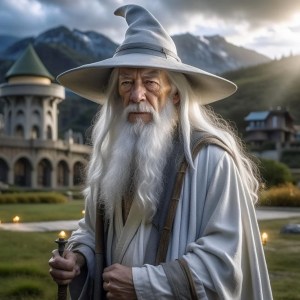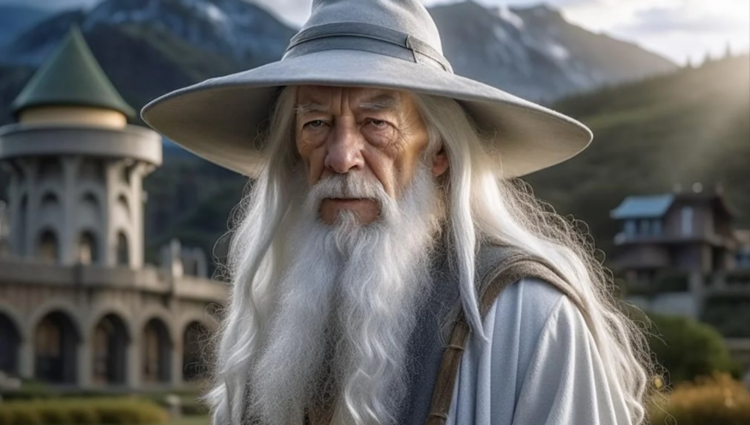I enjoyed Peter Jackson’s film version of “The Lord of the Rings” and accept that a film adaptation is just that: an adaptation. However, my objection to the film rests at a more fundamental level: I object because filmic versions of fantasy fiction serve to abolish the imagination.
 Most Imaginative Conservative readers are fans of J.R.R Tolkien’s great masterpiece The Lord of the Rings. However, debates erupt and bubble over Peter Jackson’s film adaptation:
Most Imaginative Conservative readers are fans of J.R.R Tolkien’s great masterpiece The Lord of the Rings. However, debates erupt and bubble over Peter Jackson’s film adaptation:
“It was a mistake to omit Tom Bombadil”
“It was right to omit Tom because it would be impossible to convey Bombadil’s underlying profound and mysterious character. He would simply have come across as a dancing, prancing country bumpkin… a Tolkienesque version of the scarecrow from The Wizard of Oz.”
“I hated that Jackson used Gimli for comic relief.”
“Do you understand drama and the serious use of comic relief? It’s not simply to make you giggle you know!”
“How could Jackson simply cut the Scouring of the Shire? Doesn’t he know part of the hero’s quest is to return home and save his people?”
“The Scouring of the Shire is extraneous. It would have added an extra half-hour to an already over-long movie.”
“He made Galadriel into a witch.”
“The orcs were turned into slapstick villains. That was dumb.”
“Shelob’s Lair wasn’t terrifying enough.”
“Why didn’t Gandalf just give the ring to the eagles and tell them to drop it into the Cracks of Doom?”
And so forth and so on ad infinitum.
I enjoyed Mr. Jackson’s film version of The Lord of the Rings and accept that a film adaptation is just that: an adaptation. That means the story is adapted for a new medium.
However, my objection to the film version of The Lord of the Rings is at a more fundamental level, and one which applies to the filmic versions of any work of fiction—but especially fantasy. I object because filmic versions of fantasy fiction serve to abolish the imagination.
Here’s why: When an author creates a fantasy story, he creates an alternative world out of his imagination. That world is, of necessity, constructed from the ingredients of the author’s mind, his lived experience and the realities of his material world. If you have any doubt about this, take a week-long hiking vacation in the Welsh borders—one of the most beautiful and evocative regions of rural Britain. Tolkien hiked those windswept hills with C.S. Lewis, and when you stomp across those mountain tracks and breathe that fresh Welsh air, you can visualize the long trek of Frodo and his friends through Middle Earth.
There are the groves of trees, the barren hills, the mysterious ruined towers. There the low clouds roll across the horizon, and there is an ancient long barrow where they found bones and buried treasure. If you camp out there you will dream of a barrow wight and may feel that Tom Bombadil will dance you awake in the bright morning.
That was the world of Tolkien, and it became a main ingredient of his story. This, combined with his love of languages, Norse mythology, Catholic spirituality, and a whole range of other experiences and influences contribute to the creation of his great saga.
But then as you read his story you interpret it through the filter of your experiences, memories, literature, and learning. The world Tolkien puts on the page lives in your mind through your unique imagination. Frodo and his friends march through Tolkien’s Middle Earth, but the way you see it must be your Middle Earth, not Tolkien’s.
This is the powerful covenant between the sub-creator of a fantasy world and the reader. It is an especially powerful covenant because through the imagination the mind is engaged and opened, and when as it is opened through imagination it is also opened to truth. The truth, beauty, and goodness within the story are also exchanged in the covenant between author and reader.
When the story makes its way to the screen the imagination is abolished. Peter Jackson and his crew have made Middle Earth visible and in doing so, have abolished the imagination. Now, whenever I read Lord of the Rings I do not envision Tolkien’s Middle Earth or my own Middle Earth: I envision Peter Jackson’s Middle Earth.
Does this mean I must be a film Luddite and movies are “bad”? Of course not, but film adaptations—especially of fantasy fiction—will always be unsatisfactory. Better for writers to develop their own fantasy stories specifically for film, and to use that technology to spin fantastic tales of their own. Good examples of original fantasy and science fiction developed for film are Minority Report, Star Wars, The Matrix, and any number of original tales specifically written for cinema. While they may not nurture and spark the imagination the way reading does, when well crafted, they will still take the viewer on a dramatic journey that could be enlightening, inspiring, and revelatory.
The Imaginative Conservative applies the principle of appreciation to the discussion of culture and politics—we approach dialogue with magnanimity rather than with mere civility. Will you help us remain a refreshing oasis in the increasingly contentious arena of modern discourse? Please consider donating now.
The featured image is courtesy of Pixabay.


